2024-2025
The Gulf Going Forward: A Tradition of Change
Read the full report here.
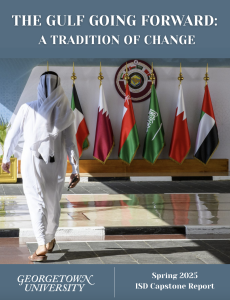
The Gulf Cooperation Council (GCC) states have grown into significant middle powers over the past decades. Bahrain, Kuwait, Oman, Qatar, Saudi Arabia, and the United Arab Emirates (UAE) nimbly exercise strategic autonomy through economic might, careful multi-alignment, credible self-defense strategic assets, and constructive diplomacy on the world stage. What can be called “the Khaleeji social contract,” a traditional yet dynamic social code through which the Gulf’s ruling families have invested in their people, has been instrumental in the rise of the Arab Gulf states. Now, as the age of fossil fuels declines and oil revenues gradually disappear, they are each in their own way extending this same dynamism to the energy transition, their security architecture, and diverse partnerships across the political and economic spheres. In a region renowned for its instability, the six constituent states of the GCC have proven remarkably resilient. Since 1979, they have weathered three major regional wars, the periodic collapse of oil prices, and the 2011 Arab Spring uprisings. At the same time, they have cultivated cohesive national identities and initiated political reforms to enhance their legitimacy while maintaining traditional familial dynastic control. The ruling families, which can number in the thousands, have fulfilled the Khaleeji social contract by fostering economic growth, sharing hydrocarbon wealth with their citizens, and investing in infrastructure, security, and education. Indeed, their Human Development Index (HDI) scores rank among the highest in the world. Despite their success, however, they face a new challenge: how to maintain stability, security, and prosperity in the face of climate change as global demand drops for the fossil fuels that have funded the social contract and temperatures in the Gulf soar.
Today, U.S. policy should support the Arab Gulf’s entrepreneurialism rather than get trapped in a zero-sum game with China over Cold-War-like spheres of influence. As the Arab Gulf states face new challenges in the 21st century, they are updating their social contracts to meet the moment. Instead of standing idly by, these states are expanding their technological, economic, and security boundaries in pursuit of improvement. It is this pursuit that will steward their growth in the next decades.
Pillars of Democracy: The U.S. Strategy for Building Resilience Against Illiberalism in Latin America
Read the full report here.
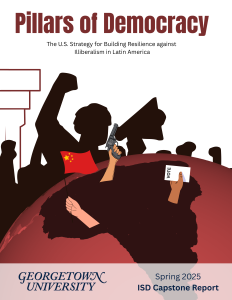
Illiberalism is on the rise in the Americas. The region, once a bastion of post-Cold War democracy with countries like Brazil, Chile, and Uruguay forging strong liberal institutions after overthrowing dictators, is experiencing a period of democratic backsliding. Recent developments include growing corruption and the democratic election of strongmen, coupled with deteriorations in the rule of law and institutions in countries such as Venezuela, El Salvador, and Nicaragua. There are interlacing causes behind the trend, including high rates of violent crime, economic discontent, and the subsequent rise of populist leaders who promise solutions to these problems.
The rise of illiberalism in the region, which is characterized by increasing authoritarian or undemocratic political systems, suppression of civil liberties, and the degradation of the rule of law, threatens core U.S. interests: notably, illiberalism hinders the advance of democracy and mutual economic prosperity, the control of drug flows, and transnational organized crime. Additionally, growing Chinese interest in the region offers many Latin American governments an attractive alternative, posing a threat to U.S. interests. These challenges create various short- and long-term obstacles to building strong, productive, and enduring U.S. partnerships in the Americas. During his first international trip in his capacity as Secretary of State, Marco Rubio stated, “For many reasons, U.S. foreign policy has long focused on other regions while overlooking our own. As a result, we’ve let problems fester, missed opportunities, and neglected partners. That ends now.” In this spirit, U.S. policymakers should take an active and thoughtful role in combating illiberalism close to home to ensure the Americas continue to prosper while ensuring partnerships fulfill key economic and security goals, as well as other objectives—such as curbing irregular migration and promoting human rights.
America’s Assassin’s Mace: Blunting China’s Economic Prowess in the Indo-Pacific
Read the full report here.
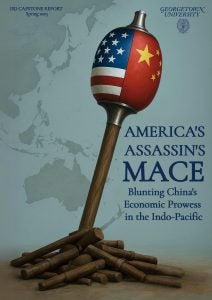
The United States is entering a period of escalating great power competition with the People’s Republic of China (PRC). China poses a unique challenge due to its rapid accumulation of military, economic, and development power worldwide. Competition with China will rely far more on economic tools, especially development finance, trade, investment, and digital technologies. This report examines how the Trump administration should leverage new and existing policies to ensure U.S. success in the Indo-Pacific, while safeguarding domestic interests. It recommends that the administration adopt a comprehensive national security strategy focused on economic policy across four pillars: (1) supply chain integrity, (2) technology, (3) maritime security, and (4) environmental security.
The term “assassin’s mace” or “shashoujian” has traditionally had a military connotation, referring to the PRC’s development of asymmetric capabilities designed to blunt American power. Today, the PRC applies its influence across the four aforementioned domains to advance its strategic interests, often at the expense of U.S. global interests and domestic priorities, posing a threat to the world economy. To respond effectively, the United States should develop its own economic “assassin’s mace” to strengthen its competitive position. This report outlines a comprehensive set of policy solutions, forming a U.S. economic “assassin’s mace” designed to address key challenges to U.S. interests and expand American economic opportunities in the Indo-Pacific.
Make the Rules, Don’t Quit The Game: How Strategic Engagement in Multilateral Institutions Makes America Safer, Stronger, and More Prosperous
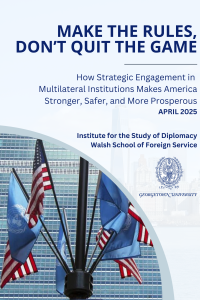
The United States has led the multilateral system for 80 years. While its engagement should not diminish, it is time for the United States to advance bold reforms to overcome the dysfunction in central parts of the multilateral system. The multilateral system, and the contributions the United States makes to it, must make America stronger, safer, and more prosperous. In a world marked by intensifying global challenges, such as migration, transnational crime, or artificial intelligence, the current multilateral regime is neither appropriately responsive nor sufficiently aligned with U.S. interests. However, this report argues that multilateralism done right can be a potent force multiplier for U.S. interests worldwide. This report proposes several recommendations under each pillar of the current U.S. Administration’s foreign policies—strength, safety, and prosperity. Under each pillar, the report outlines how ambitious reform of multilateral institutions and their purposeful employment supplementing U.S. foreign policy goals can deliver value, save money, and advance U.S. interests.
Multilateral institutions can make the United States stronger. By retaining the pen in the UN, and not letting competitors such as China rewrite the rules of international engagement, the United States can solidify its global leadership, advance norms and governance standards in line with U.S. interests and conducive to U.S. businesses, for instance in the artificial intelligence domain, and lastly, build strategic coalitions with rising middle powers. The United States can enhance its safety by drawing on multilateral institutions. Select partners can assist the United States in curbing migration and reducing transnational crime in the Western Hemisphere. Multilateral institutions can also effectively supplement the pursuit of other national security and safety objectives, such as nuclear non-proliferation, reducing international instability and unpredictability, as well as global pandemic preparedness and response.
Finally, multilateral institutions hold opportunities to make the United States more prosperous and ensure U.S. economic pre-eminence. Working through international organizations, the United States can facilitate private sector activities and offer avenues for new markets, for example in the realm of agriculture. Furthermore, these institutions are instrumental in upholding the global economic rules which protect U.S. businesses and facilitate the global economic exchange which has made the United States into the greatest economy in history.
Reformed multilateral institutions can act as force multipliers for U.S. policy objectives, and ensure for the American people strength, safety, and prosperity for decades to come.
2023-2024
The Illiberal Turn: Decelerating Latin American Democratic Backsliding
Read the full report here.

The Western Hemisphere influences the prosperity of the United States (U.S.) more directly than any other region in the world. As a result, U.S. policies are designed to promote a secure, middle-class, and democratic landscape within Latin America and the Caribbean (LAC). However, the erosion of democratic norms and the emergence of illiberal states in LAC threaten regional stability, economic growth, and the integrity of the international rules-based order. This trend is further exacerbated by transnational crime, climate change, rising inequalities, strategic competition, populism, and institutional degradation.
To counteract democratic backsliding, this paper examines past U.S. initiatives aimed at fostering democracy throughout the region. The analysis reveals that the United States has frequently approached the region through a one-size-fits-all lens; however, this paper underscores the need for policies that are tailored to the distinctive needs and contexts of individual countries.In line with this perspective, the recommendations presented incorporate the Human Empowerment Model, which addresses existential, psychological, and institutional dimensions at the country level to effectively advance democratic efforts. When used alongside democracy scorecards like the Millennium Challenge Corporation (MCC) and our internally developed“Democracy Gauge Index,” the U.S. can conduct a comprehensive assessment of countries’ strengths and weaknesses, aiding in the prioritization and efficacy of interventions.
Ultimately, addressing illiberal governance requires country-specific strategies, innovative solutions, and strengthened multilateral partnerships. By prioritizing empowerment and collaboration, the United States can effectively mitigate the effects of democratic backsliding,ensuring a secure, democratic, and prosperous Western Hemisphere
Empowering Allies and Partners to Resist PRC Power Projection in the Indo-Pacific
Read the full report here.

The People’s Republic of China (PRC) is more economically powerful, militarily capable, and politically connected than at any time in the past, and its growing national power increasingly poses a threat to U.S. and Western interests in the Indo-Pacific. The Chinese Communist Party (CCP), which frequently draws upon historical global oppression of China—like the Century of Humiliation—to stir up nationalist fervor, is bent on achieving “national rejuvenation” by the hundredth anniversary of the founding of the PRC in 2049. Though “national rejuvenation” lacks a formal definition, experts understand it to mean the development of an integrated military, economic, and political strategy to displace the United States from supremacy in the Indo-Pacific, and ideally even the broader global order.
Such displacement—leaving China all but in charge—would threaten the viability of a free and open Indo-Pacific (FOIP) for a number of reasons. Politically, as bolstered by economic interdependence and through its Belt and Road Initiative (BRI) investments, China is increasingly in a position to coerce diplomatic support for its initiatives worldwide and in multilateral fora. These initiatives include marginalizing support for Taiwan’s autonomy. The isolation and steady dismantling of a vibrant democracy and potential hostile takeover of an autonomous state would directly implicate Indo-Pacific safety and security. Militarily, Chinese preeminence would likely fuel an arms race in the region. In addition to China’s disproportionately powerful military, its relationships with North Korea and Russia threaten other powerful regional players, like South Korea and Japan, in part due to ongoing territorial disputes. Economically, the East and South China Seas, home to the critical Malacca, Sunda, Lombok, and Makassar straits, facilitate more than half of the world’s annual merchant fleet tonnage and a third of all maritime traffic worldwide. China, which has a history of bullying its neighbors to conform to its baseless and legally debunked Nine Dash Line territorial claims, cannot be a responsible steward of such an economically vital global commons.
For those reasons and more, the United States cannot let itself be displaced. By contrast, it must increase its power in the Indo-Pacific. The Biden Administration has already gone to great lengths to message U.S. commitment to Indo-Pacific security: the region is featured heavily in the 2022 U.S. National Security Strategy and the Administration’s approach is further particularized in its 2022 U.S. Indo-Pacific Strategy. This report presents a multi-domain set of recommendations for the United States to accelerate and expand these ongoing commitments to increase its relative power vis-à-vis China. What distinguishes this report from others is that its recommendations are centered around a common theme of empowering allies and partners, and thus strengthening the United States’ greatest advantage relative to China.
2022-2023
An Agenda for U.S. Engagement in Multilateral Institutions
Read the full report here.
In his first foreign policy address at the State Department, President Biden declared that “America is back. Diplomacy is back at the center of our foreign policy.” Over the past two years, the United States has re–engaged with international organizations, reinforced traditional security alliances, and worked with allies and partners to address common global challenges. Although some Trump–era policies remain in force, most notably on trade, investment, and immigration, the Biden–Harris administration has re–adopted conventional U.S. positions in many areas, including international security, the rule of law, development, health, and climate. While the idea of great power competition continues to affect U.S. foreign policy, many administration officials frame it as a contest between democracy and authoritarianism: the United States ought to compete with authoritarian states, such as Russia and China, by rallying the world’s democracies and defending the value of democracy both at home and abroad. The success of this strategy depends in no small part on whether the United States can demonstrate its commitment and willingness to work with other countries.
The recommendations detailed in this report offer one way forward for the current administration. They are designed to address the threat of far–right populism at home, the rise of emerging powers, and challenges related to powerful non–state actors. The recommendations are illustrative; the report does not address all current or future challenges related to artificial intelligence, nuclear proliferation, or conflict–related migration, to name a few. They provide U.S. policymakers with potential options for how to reinforce the institutions of the current international order and address several major challenges related to peace and security, climate, energy, development, and data privacy. By implementing these recommendations over the next year and a half, the United States can better work with like–minded partners and compete with adversaries. Overall, these reforms can help the United States adapt to both current, and unforeseen, challenges within the international system, and promote greater security and prosperity at both home and abroad.
Global Solidarity: Invigorating the U.S. Response to Russia’s War Against Ukraine
Read the full report here.
Russia’s illegal invasion of Ukraine poses a clear existential threat to Ukraine’s state sovereignty and the U.S.-led international order. Russia’s war has challenged the accepted post-World War II order that has helped to shape international security, diplomatic norms, and the humanitarian environment. A subsequent Russian victory would legitimize its territorial aggression, directly challenge the European security architecture, and undermine existing international norms. Thus far, the United States and its core allies have responded quickly toRussian aggression, providing Ukraine with materiel support and intelligence, imposing sanctions and export controls on Russia, and introducing a series of UN resolutions to condemn the Kremlin’s behavior and isolate Russia. However, current and previous U.S. policy has not stopped Russia from attempting its retrograde ambitions. This paper provides recommendations that aim to restore Ukraine’s state sovereignty, guarantee that NATO and Ukraine can deter Russian aggression, and that the U.S. and its allies can respond to future actions by revisionist leaders that challenge the accepted international norms.
To achieve the aforementioned goals, the United States should adjust its current policy approach to focus on three main pillars: defense, diplomacy, and development. First, under the defense pillar, this paper recommends that the United States should focus on redesigning theEuropean security architecture, deterring Russia’s use of nuclear weapons, and mitigating the flow of disinformation. The policies outlined in the defense pillar will help set conditions for Ukrainian success on the battlefield. However, equally important, is creating the international landscape for Ukrainian success both during the kinetic fighting and, eventually, at the negotiating table. As such, under the diplomacy pillar, this paper recommends that the United States focus on reforming the North Atlantic Treaty, addressing China in the context of Russia’s war against Ukraine, and building coalitions to more effectively isolate Russia. Finally, the United States needs to ensure immediate aid to secure the strongest possible military and diplomatic position for Ukraine to engage in future negotiations. Under the development pillar, this paper provides recommendations on the return of refugees and internally displaced people to a secure Ukraine, while seeking to ensure that all of their basic needs are met.
Great Power Competition in the Gulf: A Strategy for Competition, Cooperation, and Confrontation
Read the full individual paper here.
The diplomatic and economic relations of Gulf governments have undergone a serious shift in the 21st century as the Gulf’s largest source of trade and biggest oil export destination has flipped from the US to the People’s Republic of China (PRC). The growing PRC economy and the PRC’s massive population have driven sky-high energy consumption rates, which have led to similarly drastic increases in oil imports from Gulf states. At the same time, this economic marriage of convenience has grown into a more substantial connection as the PRC government tries to economically offset oil imports with investment exports. Gulf leaders welcome the PRC’s construction expertise and agnostic opinions on their domestic affairs, while PRC officials welcome the Gulf’s politically stable investment environment.
The PRC’s state-run economy has invested heavily in infrastructure projects in the Gulf through its Belt and Road Initiative (BRI). The BRI’s Silk Road Economic Belt runs through Iran and the Maritime Silk Road Initiative runs through Gulf ports. Specifically, PRC companies have invested billions of dollars in Duqm Port in Oman, Khalifa Port in Abu Dhabi, and Hamad Port in Qatar, among others. With long-term concession agreements have also come overt and covert increases in PRC military activity, which the Department of Defense watches with a close eye. The PRC government established comprehensive strategic partnerships (CSPs) with Saudi Arabia, the United Arab Emirates (UAE), and Iran in the late 2010s, which come with increased bilateral investment and exchanges. The US is careful to publicly state that it will not force countries to choose between the US and the PRC as the two states enter an era of great power competition, but external governments must assess their own domestic risks that are associated with a sinking US-PRC relationship.
Gulf leaders should encourage US-PRC competition on economic engagements, such as space cooperation, free trade agreements, and advanced technology. The US should provide technologically and cost-effective alternatives to PRC-supported critical infrastructure if it is going to ask Gulf governments to limit their cooperation with PRC companies, such as Huawei and ZTE. The US and the PRC are two global leaders in the development of renewable energy and Gulf leaders should promote competitive bidding processes between companies from the two countries, among others, to support the Gulf’s transition away from hydrocarbon energy. The US and the PRC can also cooperate on diplomatic initiatives in the region through multilateral groupings and build on the agreement between Iran and Saudi Arabia that the PRC brokered to increase the US’s engagement with Iran and address the Iranian nuclear question.
A New Humanitarian Partnership: U.S. Engagement with Gulf State Donors
Read the full individual paper here.
Since the early 2000s, the governments of Saudi Arabia (KSA), the United Arab Emirates (UAE), Kuwait, and Qatar have become increasingly important actors in the humanitarian system. KSA, the UAE, and Kuwait have each regularly been among the top ten donors in the world and provided a majority of assistance in several major crises. While Qatar has provided less overall assistance, it is one of the most generous governments when measured as a percentage of gross national income. In addition to their generosity, the wealthiest Gulf states have played leading roles in building Islamic assistance mechanisms while taking greater interest in the governance of UN and INGO humanitarian organizations. The growing involvement of the Gulf states presents the USG with an opportunity it must not miss.
Over the last seventy years, the government of the United States (USG) and its European allies provided a vast majority of humanitarian assistance (HA) and built a humanitarian system that is highly responsive to their interests and needs. However, the continued dominance of the West in humanitarian governance and finance is unsustainable. As global humanitarian needs continue to outpace funding, the pool of donors must expand, and the leadership of the humanitarian regime needs to incorporate new stakeholders. The Gulf states have the potential to play a key role in this process of change.
Working with Gulf states will be complicated. These states each have multifaceted relationships with the USG and are critical to American interests on many fronts. Most of the Gulf states host US military installations and have taken part in US security operations. These states also play critical roles in the international economy, particularly, but not exclusively, through their role as swing energy producers. In diplomacy, several of the Gulf states have acted as irreplaceable backchannels and mediators for successive American administrations. In all of these contexts, the Gulf states are no longer American proxies, if they ever were. As highly sophisticated states with a clear sense of their own interests, the Gulf states are global players in their own right.
If the USG hopes to work with the Gulf states on humanitarian issues over the long-term, it will need to be able to walk and chew gum at the same time. Security interests, human rights concerns, and economic cooperation will compete for attention with humanitarian partnership. However, humanitarian engagement with the Gulf states provides an opportunity for mutual benefit and the chance to increase Gulf state buy-in to the US-led international order. Therefore, elevating humanitarian cooperation with the Gulf states to an administration priority is critical.
2021-2022
Return of the Gaslit Democracies: A U.S. Strategy to Counter Disinformation Campaigns Abroad
Read the full report here.
Disinformation, the distribution of intentionally false information to manipulate a target audience, threatens democracy. By infusing a democracy’s information ecosystem with falsehoods, splintering political consensus, and eroding trust in journalism, disinformation threatens electoral integrity and allows foreign malign actors to influence democratic politics. State-sponsored disinformation campaigns are not new, but the mass adoption of social media in the 21st century has made them more harmful. Social media usage lowers the barriers to entry for disinformation operations, heightens the anonymity of malign actors, and greatly increases the quantity and diversity of disinformation.
The vastness of information on social media makes the elimination of disinformation impossible and would make blunt efforts repressive. The United States must address online discourse as it would any other sensitive ecosystem: carefully and accounting for the interdependence of all its stakeholders. The U.S. government should cultivate a cleaner, fact- based global information environment by creating mechanisms to better share factual information, forging partnerships with key allies and organizations, and implementing programs that minimize the spread of disinformation by foreign malign actors on digital platforms. In light of the complexity of online discourse, this strategy seeks to reduce, rather than eliminate, disinformation.
In order to achieve the desired end–state, the U.S. government should: (1) directly combat disinformation overseas through the Department of State (DOS), the Department of Defense (DOD), and the Intelligence Community (IC) under the coordination of DOS’s Global Engagement Center (GEC); and (2) partner with private actors, including social media platforms and civil society organizations (CSOs), to innovate and counter disinformation. The focus of this strategy is on foreign malign actors and their efforts overseas, and not on domestic disinformation by domestic actors. The authors acknowledge, however, that given the complexity of globalized communications in the Internet Age, domestic disinformation can be quite harmful to U.S. democracy as well.
Safeguarding Democracy: A Whole of Society Approach to Combatting Identity-Based Conflict & Resentment
Read the full report here.
Francis Fukuyama coined “the politics of resentment” to describe the rise of divisive identity politics that undermine liberal democracies’ universalism, as identity groups around the world seek recognition in increasingly divided societies. This lack of societal acknowledgement breeds resentment which political leaders can mobilize to combat perceived—and in some instances, real—affronts to a group’s dignity. This report demonstrates that identity and resentment are powerful forces in contemporary international affairs, capable of entrenching societal cleavages and intractable conflict within and between countries. These dynamics manifest in democratic contexts where extremist parties appropriate popular resentment to subvert democratic institutions, and beyond the democratic world, where illiberal leaders cultivate victimization narratives to unify their constituents against a
foreign adversary.
Traditional conceptions of interests and power in international relations center on political, economic, and security concerns. It is imperative that foreign-policy practitioners appreciate that resentment—and more broadly, identity—drives human behavior at the individual, collective, and state levels. An identity-based perspective, in a departure from conventional statecraft, would yield critical insights about how communities and states construct their interests and help craft a strategy toward preserving the liberal world order.
2020-2021
Grievance to Governance: Roadmap to a Resilient Yemen
Read the full report here.
Perhaps nowhere on Earth are the composite risks of poor governance, unfavorable geography, and climate vulnerability more perilous than in Yemen. Thirty-one years since the unification of the North and South, peace and stability remain elusive. Stretching into its sixth year, the current civil war is driven by a kaleidoscope of actors—both domestic and international—each with its own competing vision for the Yemeni state, and each with its own sense of marginalization and grievances. On one side is the internationally recognized, Saudi-coalition-supported government of President Abdul Mansour Hadi. On the other is the Iran-backed neo-Zaydi Shia militant group Ansar Allah, widely known as “the Houthis.” In addition, the Southern Transition Council (STC), a relative newcomer backed by the United Arab Emirates (UAE), aims to establish an independent southern state. At the same time, there are a range of Yemeni political players and individual figures in the mix, an ever-shifting matrix of alliances and enmities.
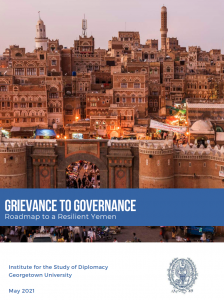
The consequence of so many actors vying for control is a fractured, incapacitated Yemen that lacks fundamental aspects of statehood. The civil war has taken an incalculable toll, leaving in its wake the deaths of nearly a quarter of a million Yemenis and the displacement of four million more. Exacerbating the humanitarian crisis are the many challenges posed by crumbling state institutions, poor resource management, and catastrophic infrastructure damage. Together, these factors have pushed Yemen to near the bottom of most global human development and gender equality indexes.
Eventually, the violence will subside. When it does, key determinants of Yemen’s future will be the degree to which its many political actors can first coalesce efforts to resuscitate the state and then take appropriate measures to prevent a relapse into conflict. One crucial element of any successful peace effort will be proper recognition and response to the real and perceived grievances across Yemen’s citizenry. Whether in absolute or relative terms, complaints of disenfranchisement plagued the political and social climate in the pre-war years.
This report does not forecast victors in the current civil war. Nor does it argue for a specific political settlement or prescribe a particular pathway to peace in the immediate term. Instead, it identifies the components that are indispensable for building an inclusive, durable Yemeni state in the medium and long term. National institutions and governance structures that are responsive to local grievances are preconditions for a stable Yemeni state and national reconciliation. Because this conflict is, at its core, a grievance-based one, this report bases its analysis and recommendations on an approach of “grievance-centered governance” that must be Yemeni-centered and Yemeni-driven, uses existing networks of service-provision to provide critical services equitably to all citizens, and enhanced the capacity of existing institutions and government structures in Yemen, whenever possible. The three pillars of this are: institutionalization of local civil society and local actors; the remagination of core state institutions and governance frameworks that are inclusive, decentralized, and oriented around local needs; and, the development of sustainable, outward-facing policies that allow Yemen to regain its sovereignty and represent the interests of its people on the international stage.
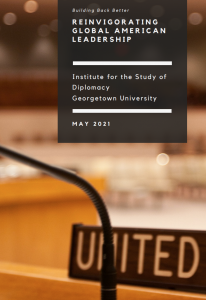 Building Back Better: Reinvigorating Global American Leadership
Building Back Better: Reinvigorating Global American Leadership
Domestic political tensions, the rise of China, climate change, and the erosion of human rights and democratic norms around the world all pose a threat to U.S. global leadership and the international system writ large. Confronted with an array of transnational threats, a backlash against globalization, and a widespread lack of trust in the country’s leadership, the United States finds itself at a critical juncture. Many in the foreign policy community argue that the post-World War II liberal international order has failed to meet the transnational security threats of the 21st century.
How can the U.S. rebuild a fractured international order that will not merely secure its interests vis-à-vis rising authoritarian challengers like China, but also rally allies, partners, and adversaries to address shared challenges that threaten U.S. national security? America must reinvigorate its leadership role in the international community, following its pivot to isolationist policies under the Trump administration. The U.S. can only compete with its adversaries if America leverages its own strengths and projects the best version of the U.S.—one that bolsters allies, strengthens multilateral cooperation and institutions, and actively shapes the international order in a positive-sum manner.
The report proposes a new vision for U.S. foreign policy—an open international order where the U.S. will shape an international environment conducive for all states to remain politically independent and free of coercion. By adopting an open-order framework, the Biden-Harris administration will fortify global confidence in multilateral cooperation and promote a new model of clear-eyed American governance that recognizes both the power and limitations of the United States as a convener and force for good in the world.
Fostering an open international system will also require selective cooperation with adversaries. The U.S. should seek to coordinate with Russia in various multilateral forums, especially on arms control issues and Afghanistan. China seeks to reshape various international institutions and organizations to reflect its own values and interests, and now leads four of fifteen United Nations (UN) specialized agencies.
To that end, the U.S. must reinforce its alliances and strategic partnerships in critical regions like the Indo-Pacific and Europe. In the latter, the U.S. should positively embrace the European Union (EU) and reinforce the transatlantic alliance to better address the challenges posed to the rules-based multilateral order.
Recording – ISD Certificate Capstones Briefing Session 10/29/2020
2019 – 2020
Strategic Re-Engagement: Advancing U.S. Leadership in Multilateral Diplomacy
75 years after the creation of the United Nations, the United States finds itself in a pivotal moment. At the beginning of a new decade, the world faces myriad challenges which require U.S. leadership and an immediate, coordinated response.
The last four years of retrenchment have signaled a return to the pernicious isolationism of America’s past. Now is the time for re-engagement. Without it, the United States’ strategic competitors — most notably China — will continue to fill the leadership void. Over the past decade, China has become increasingly active on the multilateral stage, from its leadership of UN agencies to its selective participation in the global economic order through its creation of parallel economic organizations. The following recommendations seek to provide a path forward for U.S. leadership across the spectrum of multilateral and regional organizations. This will ensure that the values of liberal democracy that have underpinned the post-war, rules-based order continue to shape the work of global institutions.
From the Ground Up:
Economic & Social Resilience in Post-Conflict Yemen
Since the collapse of the National Dialogue Conference in January 2014, warring factions dragged the Republic of Yemen into a devastating civil war, further complicated by regional rivalries and international actors. An estimated 88,000 combatants and 12,000 civilians died as a direct result of war violence and the ensuing devastation created what many term as the “world’s worst humanitarian crisis.”2 More than 2 million Yemenis are internally displaced and over half of the population is experiencing famine. Humanitarian organizations estimate that 3.3 million children experience malnutrition and 84,000 died.3 As of 2017, gender-based violence increased by 63 percent, 19.4 million people lacked access to clean water leading to the worst recorded cholera outbreak in history, and 70 percent of the workforce experienced job loss.4,5 Hauntingly, according to the UN’s Resident Humanitarian Coordinator, Lise Grande, 80 percent of Yemenis need humanitarian aid, with 50 percent of all Yemenis in acute need of assistance. While the situation in Yemen is dire, it is important for stakeholders to remember Yemen is more than the sum of its devastating statistics.
Forging Unity: Building Toward a Stronger Maghreb
Despite its immense potential, North Africa suffers from significant national and transnational issues that threaten the region’s long-term stability and prosperity. These transnational challenges require transnational solutions, but past attempts to integrate the region have accomplished little. The United States’ fragmented policy approach to North Africa has failed to improve the situation and has often exacerbated it. While North Africa does not rank first in U.S. policy priorities, the United States has a vested interest in helping create a North Africa that is stable, prosperous, connected, and integrated with the international community. Achieving this goal will require U.S. leadership and a clear, unified regional strategy that makes maximum use of U.S. resources in concert with those of European and African partners.
2018 – 2019
YEMEN: BUILDING FROM THE BRINK
A ROADMAP FOR RECONSTRUCTING A SHATTERED STATE
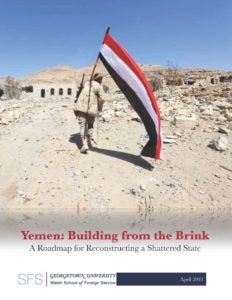 The Issue. Since 2015, Yemen has been gripped by complex, brutal, and overlapping conflicts – each including a variety of domestic and foreign actors with competing agendas – that have crashed Yemen’s economy, fractured basic governance structures, and resulted in a catastrophic humanitarian crisis. The United Nations-brokered December 2018 Stockholm Agreement may be the necessary first step toward a comprehensive peace agreement, but it may not be a sufficient basis on which to build Yemen’s path back to political and economic viability.
The Issue. Since 2015, Yemen has been gripped by complex, brutal, and overlapping conflicts – each including a variety of domestic and foreign actors with competing agendas – that have crashed Yemen’s economy, fractured basic governance structures, and resulted in a catastrophic humanitarian crisis. The United Nations-brokered December 2018 Stockholm Agreement may be the necessary first step toward a comprehensive peace agreement, but it may not be a sufficient basis on which to build Yemen’s path back to political and economic viability.
The Importance. Yemen is home to 29 million people, four in five of whom require some form of humanitarian or security assistance. 1 Its strategic location, close to the Persian Gulf, the Bab Al Mandab, and the Horn of Africa, has long drawn in international actors, from the Romans, through the Ottoman Empire, to the British and now the Arab Gulf states. Each of these actors have sought to control the vital sea lanes and trade routes on which Yemen lies. To recover from the humanitarian crisis, to enable Yemenis to capitalize on their country’s strategic location, and to reduce the risk of renewed conflict, Yemen and the international community must plan for a post-conflict state.
The Road Ahead. After a conflict-ending agreement is reached, the Yemeni central government will need to re-establish effective governance systems, ensure the delivery of services, and provide security to its citizens. With a focus on those areas, Yemenis and the international community can establish the foundations of a stable and sustainable state.
CREATING A FUTURE: A ROADMAP FOR SOUTH SUDAN
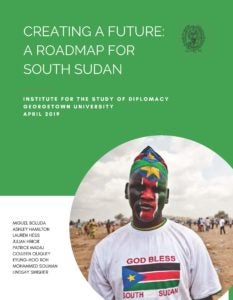 Since 2013, just two years after attaining a hard-fought independence, South Sudan has been immersed in a violent and complex conflict in which thousands have died and over a million people have been displaced. This conflict has resulted in economic, political, and humanitarian tolls on the country and its people. With immense challenges and no viable end to the conflict in sight, South Sudan is already experiencing donor frustration and fatigue as efforts to end the war have failed and key humanitarian programs and initiatives are underfunded. In short, the war in South Sudan must end now. This policy paper examines the complex aspects of the conflict and makes ten recommendations that encompass two critical areas of focus for South Sudan: ending the fighting and sustaining the peace.
Since 2013, just two years after attaining a hard-fought independence, South Sudan has been immersed in a violent and complex conflict in which thousands have died and over a million people have been displaced. This conflict has resulted in economic, political, and humanitarian tolls on the country and its people. With immense challenges and no viable end to the conflict in sight, South Sudan is already experiencing donor frustration and fatigue as efforts to end the war have failed and key humanitarian programs and initiatives are underfunded. In short, the war in South Sudan must end now. This policy paper examines the complex aspects of the conflict and makes ten recommendations that encompass two critical areas of focus for South Sudan: ending the fighting and sustaining the peace.
South Sudan’s turbulent history begins well before the country received internationallyrecognized statehood. After British colonial powers departed Sudan in 1956, southern Sudan experienced social discrimination and economic marginalization that led to a desire for self-determination among southern populations. The result was nearly 40 years of civil war with Arab pitted against African, Muslim against Christian. The eventual break with Sudan in 2011 left South Sudan with limited institutions, weak governance, and a vulnerability to the resulting power struggle between current President Salva Kiir and former first Vice President Riek Machar that has led to divisions along ethnic lines.
ISTANBUL STEPPING STONE CONFERENCE: A COMPREHENSIVE SOLUTION TO THE SYRIAN REFUGEE CRISIS
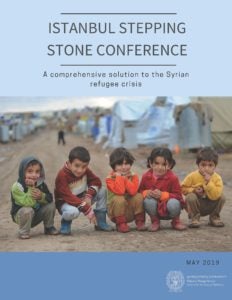 This report proposes a UN-led international conference in Istanbul to provide durable solutions for as many Syrian refugees as possible. The evolution of conditions in Syria creates a window of opportunity for voluntary, safe, and dignified returns. Arab states are beginning to normalize relations with Syria; Russia is promoting returns; ISIS no longer occupies Syrian territory; Iran faces increasing difficulties in its ability to supply oil to the Syrian regime; and the Assad government is looking to solidify its military gains. It is urgent to undertake this effort now because the stress on refugee hosting countries threatens to destabilize the region. Syrian refugees deserve a pathway towards dignified lives for themselves and their children.
This report proposes a UN-led international conference in Istanbul to provide durable solutions for as many Syrian refugees as possible. The evolution of conditions in Syria creates a window of opportunity for voluntary, safe, and dignified returns. Arab states are beginning to normalize relations with Syria; Russia is promoting returns; ISIS no longer occupies Syrian territory; Iran faces increasing difficulties in its ability to supply oil to the Syrian regime; and the Assad government is looking to solidify its military gains. It is urgent to undertake this effort now because the stress on refugee hosting countries threatens to destabilize the region. Syrian refugees deserve a pathway towards dignified lives for themselves and their children.
Around three-quarters of Syrian refugees in Egypt, Iraq, Lebanon, and Jordan have stated that they intend to return to Syria one day, and around six percent of them intend to return in the next 12 months, independent of a political solution. While the United 1 Nations High Commissioner for Refugees (UNHCR) outlines a series of comprehensive protection thresholds that must be met to transition from ‘Phase 1’ to ‘Phase 2,’ conditions in Syria merit a Phase 1.5 approach. Syria may be witnessing instability for a long period of time. Durable solutions must provide a bridge to support spontaneous returns, build the necessary conditions to enhance protection and sustainability of returnees, and work to improve conditions for refugees outside of Syria and the communities that host them.
PURPOSEFUL MULTILATERAL ENGAGEMENT: PRESERVING U.S. LEADERSHIP IN THE 21ST CENTURY
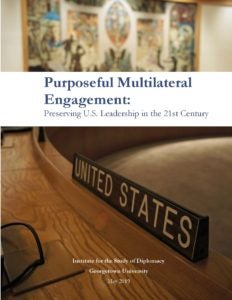 The election of Donald Trump in 2016 reflected a growing American dissatisfaction with a liberal international order many believed had not delivered. Since the end of World War II, the U.S. has been instrumental in establishing and maintaining the rules-based international system and the institutions that govern it. In recent decades, however, perceptions that the United Nations and other multilateral organizations were ineffective and, in some cases, threatened U.S. sovereignty have merged with disenchantment over the economic promises of globalization. This merger propelled a self-described “America First” candidate to the White House.
The election of Donald Trump in 2016 reflected a growing American dissatisfaction with a liberal international order many believed had not delivered. Since the end of World War II, the U.S. has been instrumental in establishing and maintaining the rules-based international system and the institutions that govern it. In recent decades, however, perceptions that the United Nations and other multilateral organizations were ineffective and, in some cases, threatened U.S. sovereignty have merged with disenchantment over the economic promises of globalization. This merger propelled a self-described “America First” candidate to the White House.
While many voters were reacting to real demographic and economic trends, notably increased racial diversity and stagnating wages for many segments of the population, the benefits of multilateralism and the risks of disengagement were given short shrift. The incoming administration should address the public’s concerns and push for tax and other economic reforms but must also put a spotlight on the value of multilateral institutions to address the critical transnational issues of the 21st century.
2017 – 2018
A VISION FOR SUSTAINABLE PEACE: BUILDING AN INCLUSIVE FUTURE FOR SOUTH SUDAN
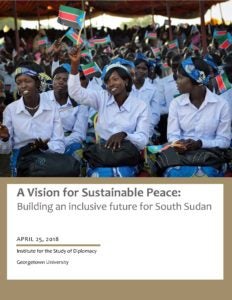 South Sudan, the world’s youngest state, is still struggling to establish a stable government that works for its people. Corruption, violence, greed, distrust, and human rights abuses are pervasive and inhibit the country from achieving peace, stability, and prosperity. The government of South Sudan, including President Salva Kiir, is responsible for perpetuating a deadly and destructive civil war, blocking progress by breaking past peace agreements, and starving its people of safety and access to education, water, health, and economic growth.
South Sudan, the world’s youngest state, is still struggling to establish a stable government that works for its people. Corruption, violence, greed, distrust, and human rights abuses are pervasive and inhibit the country from achieving peace, stability, and prosperity. The government of South Sudan, including President Salva Kiir, is responsible for perpetuating a deadly and destructive civil war, blocking progress by breaking past peace agreements, and starving its people of safety and access to education, water, health, and economic growth.
This report puts forth a new approach to ending the war in South Sudan and setting it up for success. This vision of the future is built on inclusivity, sustainability, and a fresh start with new leadership. The authors propose ten recommendations under the three goals of establishing a vision, expanding the table, and ensuring sustainable peace. Due to the complex nature of the crisis and the number of stakeholders involved in the conflict and peace negotiations, these recommendations are aimed at a wide variety of actors: the government of South Sudan, the European Union (EU), the United States, the Intergovernmental Authority on Development (IGAD), the African Union (AU), and the United Nations (UN).
THE UNITED STATES AND IRAN: COOPERATION WHERE POSSIBLE, CONFRONTATION WHEN NECESSARY
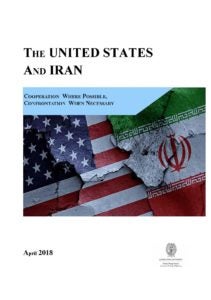 Nearly every issue in the Middle East is affected by U.S. policy towards Iran. These issues include:
Nearly every issue in the Middle East is affected by U.S. policy towards Iran. These issues include:
1) Middle East stability; 2) the conflicts in Iraq, Syria, and Afghanistan; 3) the eradication of terrorist groups like al-Qaeda, the Islamic State in Iraq and the Levant (ISIL), and Hezbollah; 4) the security of the state of Israel; 5) countering regional proliferation of weapons of mass destruction; 6) the free flow of energy; and 7) the organic evolution of the Iranian government to one more friendly to the United States. Iran has the potential to be either a helpful partner or a serious opponent to U.S. regional interests, making the bilateral relationship critical.
The United States must carefully consider where to cooperate with Iran, as well as where to adapt to or counter Iran’s growing regional influence. Failure to plan for Iran’s regional ambitions will reduce Washington’s strategic options in a region critically vital to U.S. national interests. However, there is major disagreement about Iran’s strategic and foreign policy goals, hinging on two contending perspectives. The first views Iran as a revisionist power with regional hegemonic ambitions, while the second argues Iran’s actions abroad are primarily defensive in nature. Reality is always more complex, and the truth lies in between these differing interpretations, as will be demonstrated in this report.
A ROADMAP FOR YEMEN
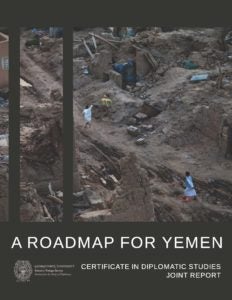 The situation in Yemen – today, right now, to the population of the country – looks like the apocalypse,” said the UN OCHA’s head of office in January. At present, Yemen faces a humanitarian crisis as a result of intersecting civil wars and a geopolitical chess match waged by the Saudi coalition and Houthi fighters in Yemen’s northern regions. While Yemen is deeply fractured, it is not beyond repair.
The situation in Yemen – today, right now, to the population of the country – looks like the apocalypse,” said the UN OCHA’s head of office in January. At present, Yemen faces a humanitarian crisis as a result of intersecting civil wars and a geopolitical chess match waged by the Saudi coalition and Houthi fighters in Yemen’s northern regions. While Yemen is deeply fractured, it is not beyond repair.
To move toward a future beyond war will require a long-term vision; policymakers must focus not simply on securing a ceasefire. They need to develop medium and long-term strategies to rebuild. Yemen’s mission objective is to become a stable, viable, and unified state that is accountable to its citizens and operates as a good regional neighbor.
This vision for Yemen will require: inclusive peace negotiations, good governance, an effective transitional justice system, critical infrastructure, and attention to macroeconomic stability and job opportunities. The central question for policy makers is: How do we get there?
2016 – 2017
EMERGING FROM THE RUBBLE: REBUILDING A UNIFIED YEMEN
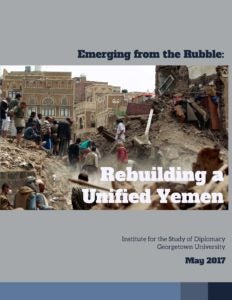 With an emphasis on inclusivity, accountability, and sustainability during the reconstruction process, the Yemeni government and international partners can ensure that new institutions and processes forge a lasting peace and durable bond between the Yemeni state and its people. Through these values, Yemenis can create a new government that lives up to the promise of the original National Dialogue Conference (NDC). The conference has maintained widespread legitimacy, even after the collapse of the transitional government and the outbreak of war, because it showcased the best of Yemeni society: its great diversity, strong social cohesion, and fundamentally democratic and communal approach to decision-making. Conflict appears likely to continue in the short-term, but Yemenis and their international partners must begin planning how to translate the inclusive spirit of the NDC into stable governance.
With an emphasis on inclusivity, accountability, and sustainability during the reconstruction process, the Yemeni government and international partners can ensure that new institutions and processes forge a lasting peace and durable bond between the Yemeni state and its people. Through these values, Yemenis can create a new government that lives up to the promise of the original National Dialogue Conference (NDC). The conference has maintained widespread legitimacy, even after the collapse of the transitional government and the outbreak of war, because it showcased the best of Yemeni society: its great diversity, strong social cohesion, and fundamentally democratic and communal approach to decision-making. Conflict appears likely to continue in the short-term, but Yemenis and their international partners must begin planning how to translate the inclusive spirit of the NDC into stable governance.
LEADING A NEW WORLD ORDER: MEETING THE CHALLENGES TO U.S. POWER IN THE 21ST CENTURY
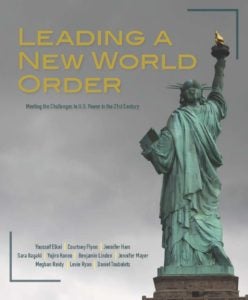 Today’s world is one of threats and challenges to the United States and the liberal international order. Some of these challenges, including the increasing power of non-state actors and a rising China poised to overtake the United States, will require creativity and flexibility. On the other hand, some of the present threats are more familiar: a belligerent Russia, anti-Americanism, and instability in the Middle East. In the face of a myriad of challenges to U.S. power in a new world order, this report provides recommendations to U.S. policymakers to maintain U.S. leadership for the benefit of the United States and the world.
Today’s world is one of threats and challenges to the United States and the liberal international order. Some of these challenges, including the increasing power of non-state actors and a rising China poised to overtake the United States, will require creativity and flexibility. On the other hand, some of the present threats are more familiar: a belligerent Russia, anti-Americanism, and instability in the Middle East. In the face of a myriad of challenges to U.S. power in a new world order, this report provides recommendations to U.S. policymakers to maintain U.S. leadership for the benefit of the United States and the world.
SUSTAINING U.S. ENGAGEMENT IN SOUTHEAST ASIA: ADVANCING AMERICAN INTERESTS UNDER A NEW FRAMEWORK
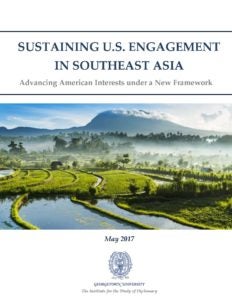 Southeast Asia is home to vital American interests—from the shipping lanes of the South China Sea to ASEAN’s remarkable advancements. Properly applied, U.S. policy in the region can help strengthen governance and rule of law, sharpen economic growth, and encourage environmental sustainability.
Southeast Asia is home to vital American interests—from the shipping lanes of the South China Sea to ASEAN’s remarkable advancements. Properly applied, U.S. policy in the region can help strengthen governance and rule of law, sharpen economic growth, and encourage environmental sustainability.
Absent careful policy choices, however, challenges in Southeast Asia have the potential to exacerbate tensions and conflict.
This report presents an integrated strategy for sustained U.S. engagement in Southeast Asia. The strategy, termed Sustainment, builds upon the gains of the Pivot and launches new initiatives.